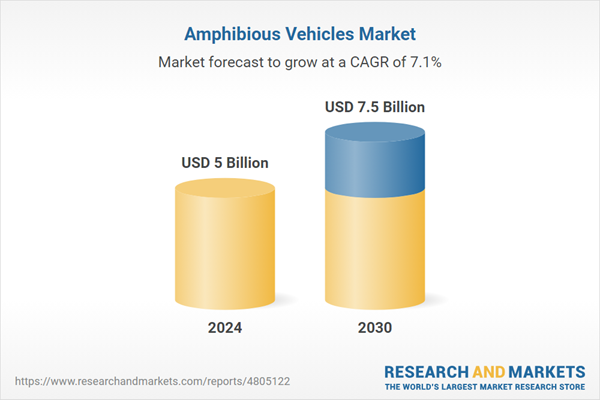Global Amphibious Vehicles Market - Key Trends and Drivers Summarized
What Are Amphibious Vehicles and Why Are They Important?
Amphibious vehicles are specialized modes of transportation capable of operating on both land and water, offering unparalleled versatility for various applications. These vehicles are crucial for military operations, providing forces with the capability to traverse different terrains without the need for specialized infrastructure. Amphibious vehicles are also invaluable in civilian sectors, particularly in disaster response and recovery efforts, enabling rapid deployment in areas affected by floods or other natural disasters. Their ability to seamlessly transition between land and water makes them essential for operations that require flexibility and rapid movement across diverse environments. The design and engineering of amphibious vehicles prioritize durability, maneuverability, and ease of transition, ensuring they can perform effectively in challenging conditions.How Are Technological Innovations Enhancing Amphibious Vehicles?
Technological advancements are driving significant improvements in the performance and capabilities of amphibious vehicles. Innovations in propulsion systems, such as the development of more efficient and powerful engines, are enhancing their speed and reliability both on land and in water. Advanced materials, including lightweight composites and corrosion-resistant alloys, are being used to build amphibious vehicles, improving their durability and reducing maintenance costs. Additionally, the integration of advanced navigation and control systems, including GPS and autonomous driving technologies, is enhancing the operational efficiency and safety of these vehicles. These technological enhancements are not only increasing the versatility and performance of amphibious vehicles but also expanding their potential applications in both military and civilian contexts.What Are the Regulatory and Environmental Considerations?
The deployment and use of amphibious vehicles are subject to various regulatory and environmental considerations. Regulatory bodies enforce stringent standards to ensure the safety and environmental compliance of these vehicles, particularly concerning emissions and the impact on aquatic ecosystems. Manufacturers must adhere to these regulations, incorporating environmentally friendly technologies and practices into their designs. Environmental considerations are also crucial, as the operation of amphibious vehicles can affect marine and terrestrial ecosystems. Efforts to minimize environmental impact include the use of eco-friendly materials, efficient fuel consumption, and advanced waste management systems. These regulatory and environmental factors are shaping the development and deployment of amphibious vehicles, driving innovation and the adoption of sustainable practices within the industry.What Is Driving Market Growth for Amphibious Vehicles?
The growth in the amphibious vehicles market is driven by several factors, including technological advancements, increasing demand for versatile transportation solutions, and rising investments in military and disaster response capabilities. Advances in propulsion systems, materials science, and autonomous technologies are enhancing the performance and appeal of amphibious vehicles, making them more efficient and reliable for various applications. The military sector is a significant driver, with ongoing investments in modernizing and expanding amphibious capabilities to meet evolving defense needs. Additionally, the increasing frequency of natural disasters is spurring demand for amphibious vehicles in civilian emergency response and recovery operations. Government initiatives and funding for infrastructure development and disaster preparedness are also supporting market growth. Furthermore, the growing interest in recreational and commercial uses, such as tourism and transportation in coastal and riverine areas, is expanding the market opportunities for amphibious vehicles. These factors, combined with the continuous innovation and development within the industry, are propelling the growth of the amphibious vehicles market.Report Scope
The report analyzes the Amphibious Vehicles market, presented in terms of market value (USD). The analysis covers the key segments and geographic regions outlined below.- Segments: Propulsion (Track-Based, Water Jet, Screw Propellers, Other Propulsions); Application (Excavation, Water Transportation, Surveillance & Rescue, Water Sports, Other Applications); End-Use (Commercial, Defense).
- Geographic Regions/Countries: World; United States; Canada; Japan; China; Europe (France; Germany; Italy; United Kingdom; and Rest of Europe); Asia-Pacific; Rest of World.
Key Insights:
- Market Growth: Understand the significant growth trajectory of the Excavation Application segment, which is expected to reach US$3.4 Billion by 2030 with a CAGR of 7.5%. The Water Transportation Application segment is also set to grow at 6.4% CAGR over the analysis period.
- Regional Analysis: Gain insights into the U.S. market, valued at $1.4 Billion in 2024, and China, forecasted to grow at an impressive 6.6% CAGR to reach $1.2 Billion by 2030. Discover growth trends in other key regions, including Japan, Canada, Germany, and the Asia-Pacific.
Why You Should Buy This Report:
- Detailed Market Analysis: Access a thorough analysis of the Global Amphibious Vehicles Market, covering all major geographic regions and market segments.
- Competitive Insights: Get an overview of the competitive landscape, including the market presence of major players across different geographies.
- Future Trends and Drivers: Understand the key trends and drivers shaping the future of the Global Amphibious Vehicles Market.
- Actionable Insights: Benefit from actionable insights that can help you identify new revenue opportunities and make strategic business decisions.
Key Questions Answered:
- How is the Global Amphibious Vehicles Market expected to evolve by 2030?
- What are the main drivers and restraints affecting the market?
- Which market segments will grow the most over the forecast period?
- How will market shares for different regions and segments change by 2030?
- Who are the leading players in the market, and what are their prospects?
Report Features:
- Comprehensive Market Data: Independent analysis of annual sales and market forecasts in US$ Million from 2024 to 2030.
- In-Depth Regional Analysis: Detailed insights into key markets, including the U.S., China, Japan, Canada, Europe, Asia-Pacific, Latin America, Middle East, and Africa.
- Company Profiles: Coverage of players such as Aquamec Ltd., BAE Systems PLC, EIK Engineering Sdn. Bhd., General Dynamics Corporation, Griffon Hoverwork Ltd. and more.
- Complimentary Updates: Receive free report updates for one year to keep you informed of the latest market developments.
Some of the 41 companies featured in this Amphibious Vehicles market report include:
- Aquamec Ltd.
- BAE Systems PLC
- EIK Engineering Sdn. Bhd.
- General Dynamics Corporation
- Griffon Hoverwork Ltd.
- Hanjin Heavy Industries & Construction Co., Ltd.
- Hefei Sunton Machinery Manufacturing Co., Ltd.
- Hitachi Construction Machinery (Europe) NV
- Kurganmashzavod JSC
- Lemac Corporation
- Lockheed Martin Corporation
- Marsh Buggies, Inc.
- NORINCO International Cooperation Ltd.
- Remu Oy
- Rheinmetall AG
- Science Applications International Corporation (SAIC)
- Textron Systems Corporation
- Tsbc Engineering Sdn. Bhd.
- Ultratrex Machinery Sdn. Bhd.
- Wetland Equipment Company
- Wilco Manufacturing LLC.
- Wilson Marsh Equipment Company
This edition integrates the latest global trade and economic shifts into comprehensive market analysis. Key updates include:
- Tariff and Trade Impact: Insights into global tariff negotiations across 180+ countries, with analysis of supply chain turbulence, sourcing disruptions, and geographic realignment. Special focus on 2025 as a pivotal year for trade tensions, including updated perspectives on the Trump-era tariffs.
- Adjusted Forecasts and Analytics: Revised global and regional market forecasts through 2030, incorporating tariff effects, economic uncertainty, and structural changes in globalization. Includes historical analysis from 2015 to 2023.
- Strategic Market Dynamics: Evaluation of revised market prospects, regional outlooks, and key economic indicators such as population and urbanization trends.
- Innovation & Technology Trends: Latest developments in product and process innovation, emerging technologies, and key industry drivers shaping the competitive landscape.
- Competitive Intelligence: Updated global market share estimates for 2025, competitive positioning of major players (Strong/Active/Niche/Trivial), and refined focus on leading global brands and core players.
- Expert Insight & Commentary: Strategic analysis from economists, trade experts, and domain specialists to contextualize market shifts and identify emerging opportunities.
Table of Contents
Companies Mentioned (Partial List)
A selection of companies mentioned in this report includes, but is not limited to:
- Aquamec Ltd.
- BAE Systems PLC
- EIK Engineering Sdn. Bhd.
- General Dynamics Corporation
- Griffon Hoverwork Ltd.
- Hanjin Heavy Industries & Construction Co., Ltd.
- Hefei Sunton Machinery Manufacturing Co., Ltd.
- Hitachi Construction Machinery (Europe) NV
- Kurganmashzavod JSC
- Lemac Corporation
- Lockheed Martin Corporation
- Marsh Buggies, Inc.
- NORINCO International Cooperation Ltd.
- Remu Oy
- Rheinmetall AG
- Science Applications International Corporation (SAIC)
- Textron Systems Corporation
- Tsbc Engineering Sdn. Bhd.
- Ultratrex Machinery Sdn. Bhd.
- Wetland Equipment Company
- Wilco Manufacturing LLC.
- Wilson Marsh Equipment Company
Table Information
| Report Attribute | Details |
|---|---|
| No. of Pages | 244 |
| Published | February 2026 |
| Forecast Period | 2024 - 2030 |
| Estimated Market Value ( USD | $ 5 Billion |
| Forecasted Market Value ( USD | $ 7.5 Billion |
| Compound Annual Growth Rate | 7.1% |
| Regions Covered | Global |









